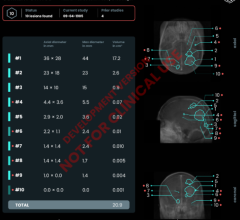July 27, 2012 — Virginia Hospital Center is among the few hospitals along the east coast to offer the new Calypso System featuring GPS for the Body technology and Beacon electromagnetic transponders for patients with certain types of cancer. This new technology provides accurate, precise and real-time tracking to keep radiation focused on the tumor resulting in fewer side effects and a better quality of life for the patient.
Using miniaturized, non-ionizing, non-radioactive implanted devices called Beacon transponders, the Calypso System continuously and accurately tracks the location of cancerous tumors. For example, these rice-sized Beacons are implanted into the prostate or prostatic bed during an outpatient procedure, and are then tracked with a 4-D localization and tracking system. If the prostate or tumor bed moves out of range during treatment, the radiation beam turns off until it comes back into range again.
The real-time position and motion information provided by the Calypso System offers objective reassurance that radiation treatment is delivered precisely to the prescribed target, not to surrounding healthy tissue.
While radiation to the pelvic area can affect urinary, bowel and sexual function, research has shown that patients treated with Calypso had significantly fewer side effects in bowel urgency and frequency, fecal incontinence and urinary irritation. They also had fewer sexual side effects. Calypso technology allows the radiation oncologist to safely and maximally cover cancerous areas while minimizing normal tissue exposure to radiation.
Studies have also shown that patients who have undergone the Calypso procedure versus other similar treatments, have lived longer, healthier lives. The Calypso's GPS for the Body is the only U.S. Food and Drug Administration (FDA)-approved technology to track tumors in real time. Calypso can be used in primary radiation treatment or as an adjunctive treatment to surgery.
For more information: www.virginiahospitalcenter.com


 February 03, 2026
February 03, 2026 









